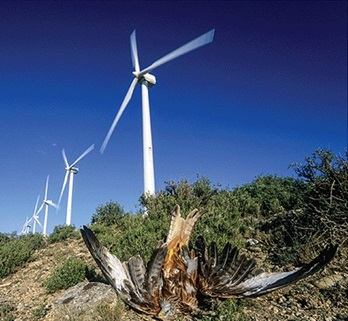11-12-2020
Objective: to plan renewable energies to protect biodiversity
Barcelona, 11 December 2020. The current accelerated and disorderly process of expansion of solar and wind energy could end up causing irreversible damage to spanish biodiversity, according to a letter published in the journal Science by a group of experts in conservation, including professors Joan Real and Santi Mañosa, from the Faculty of Biology and the UB Biodiversity Research Institute (IRBio).
Renewable energies are needed but their coexistence with biodiversity requires ambitious planning and good practices in environmental assessment processes. The twenty-three expert scientists who have signed the document express their support for renewable energies, but advocate for a more planned energy transition process based on independently proven technical and scientific knowledge that avoids harmful practices for biodiversity - for example, the splitting of projects - which are usually common. This initiative has been promoted by experts from the EBD-CSIC, together with researchers from fourteen universities and research centers throughout Spain, including the University of Barcelona.
They also advocate a greater commitment to more distributed and decentralized energy policies - with efficiency, demand management, energy saving, self-consumption and improving the energy performance of buildings - that would reduce the direct environmental impacts on biodiversity. If the multiple problems associated with the implementation of renewable energies are not addressed immediately, the energy transition could be recalled to endanger some of the country’s unique natural values, experts warn.
Reduce the impact of the energy transition on biodiversity
The current expansion of renewable energies of the National Integrated Energy and Climate Plan (PNIEC) involves the occupation of hundreds of thousands of hectares with solar and wind plants. According to experts, the new projects will affect cheap soils - especially marginal agricultural areas occupied by extensive dryland cereals or mid-mountain areas - but of great ecological value. The document warns that the ecological impact of poorly planned and built wind farms in areas where there are gliding or steppe birds could kill thousands of specimens and endanger the populations and habitats of species seriously threatened in the current events.
“It is incomprehensible that the development of renewable energies is done at the expense of biodiversity conservation. The conservation of species and habitats is as important to the future of humanity as the fight against climate change. Both challenges go hand in hand and neither can be achieved by leaving the other aside ", comment professors Santi Mañosa and Joan Real, members of the Department of Evolutionary Biology, Ecology and Environmental Sciences of the UB and IRBio-UB.
The authors of the letter state that the systems being used to reduce the mortality of birds and bats in wind farms have so far proved ineffective or difficult to implement. That is why they believe that good planning is essential, which avoids locating wind and photovoltaic equipment in areas or habitats of high interest for biodiversity.
The signed document urges the state and regional administrations - responsible for land and biodiversity management - to become aware of the enormous conservation problems that can arise from inadequate management of energy considered green.
More information:
https://science.sciencemag.org/content/370/6522/1282
Renewable energies are needed but their coexistence with biodiversity requires ambitious planning and good practices in environmental assessment processes. The twenty-three expert scientists who have signed the document express their support for renewable energies, but advocate for a more planned energy transition process based on independently proven technical and scientific knowledge that avoids harmful practices for biodiversity - for example, the splitting of projects - which are usually common. This initiative has been promoted by experts from the EBD-CSIC, together with researchers from fourteen universities and research centers throughout Spain, including the University of Barcelona.
They also advocate a greater commitment to more distributed and decentralized energy policies - with efficiency, demand management, energy saving, self-consumption and improving the energy performance of buildings - that would reduce the direct environmental impacts on biodiversity. If the multiple problems associated with the implementation of renewable energies are not addressed immediately, the energy transition could be recalled to endanger some of the country’s unique natural values, experts warn.
Reduce the impact of the energy transition on biodiversity
The current expansion of renewable energies of the National Integrated Energy and Climate Plan (PNIEC) involves the occupation of hundreds of thousands of hectares with solar and wind plants. According to experts, the new projects will affect cheap soils - especially marginal agricultural areas occupied by extensive dryland cereals or mid-mountain areas - but of great ecological value. The document warns that the ecological impact of poorly planned and built wind farms in areas where there are gliding or steppe birds could kill thousands of specimens and endanger the populations and habitats of species seriously threatened in the current events.
“It is incomprehensible that the development of renewable energies is done at the expense of biodiversity conservation. The conservation of species and habitats is as important to the future of humanity as the fight against climate change. Both challenges go hand in hand and neither can be achieved by leaving the other aside ", comment professors Santi Mañosa and Joan Real, members of the Department of Evolutionary Biology, Ecology and Environmental Sciences of the UB and IRBio-UB.
The authors of the letter state that the systems being used to reduce the mortality of birds and bats in wind farms have so far proved ineffective or difficult to implement. That is why they believe that good planning is essential, which avoids locating wind and photovoltaic equipment in areas or habitats of high interest for biodiversity.
The signed document urges the state and regional administrations - responsible for land and biodiversity management - to become aware of the enormous conservation problems that can arise from inadequate management of energy considered green.
More information:
https://science.sciencemag.org/content/370/6522/1282
